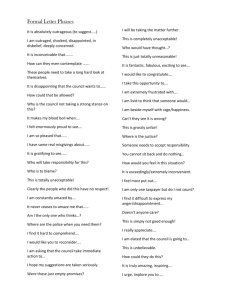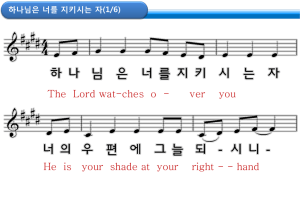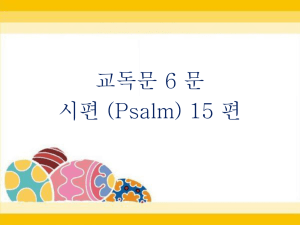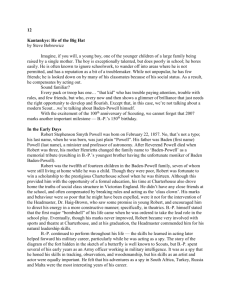Code of Conduct LBP 2014-2015
advertisement
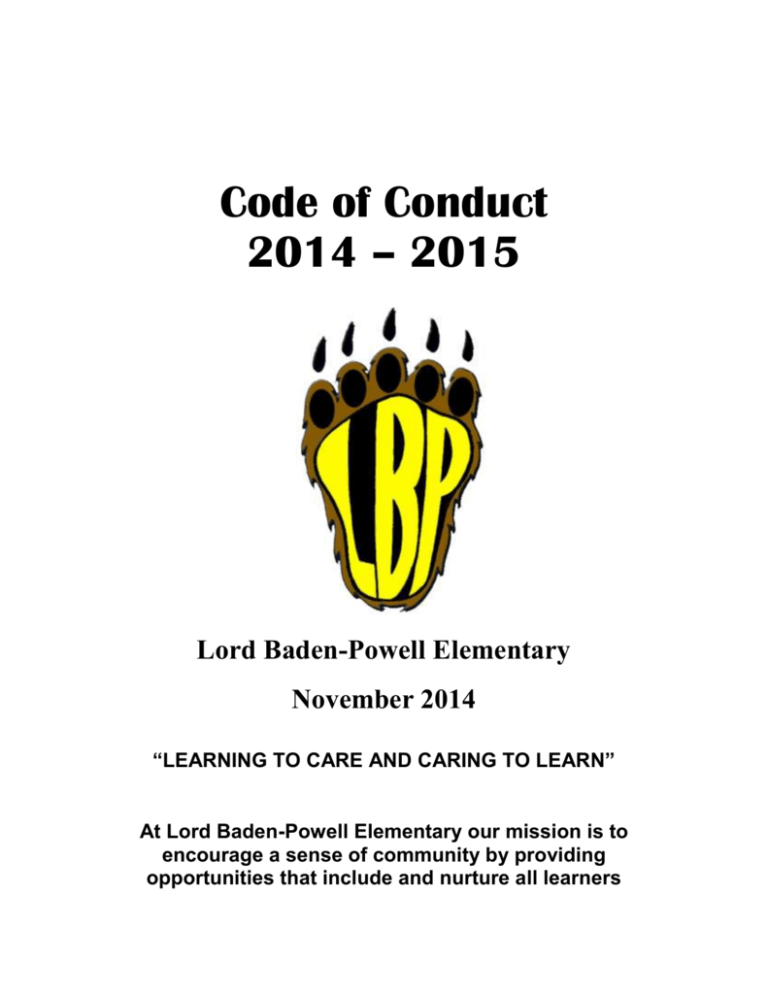
Code of Conduct 2014 – 2015 October 2006 Lord Baden-Powell Elementary November 2014 “LEARNING TO CARE AND CARING TO LEARN” At Lord Baden-Powell Elementary our mission is to encourage a sense of community by providing opportunities that include and nurture all learners Lord Baden-Powell Code of Conduct I. INTRODUCTION Lord Baden-Powell Elementary is committed to promoting and maintaining a safe, caring and orderly school environment. Through the collaboration of staff, students and parents Lord Baden-Powell works hard to create a positive school culture where learning is maximized. Teachers and parents work together to model and outline clear expectations of respectful behavior. Our Code of Conduct represents a belief that each of us is responsible for taking care of self, others, the environment and learning. Lord Baden-Powell Elementary School’s Code of Conduct outlines school expectations and acceptable student behavior, as directed by the School Act, Section 85 (2)(c). II. CODE OF CONDUCT: KEY ELEMENTS Process Lord Baden-Powell developed its Code of Conduct through: Discussions with, and input to and from, Lord Baden-Powell Elementary School staff Discussions, presentations, and input to and from, PAC Discussions and input to and from representative groups of multi-age students Discussions, presentations and input to and from the SPC Sharing Code of Conducts drafts amongst the elementary schools to ensure compatibility, consistency, and alignment of expectations. Communication Communication about the Code of Conduct occurs in a variety of ways: Parents: Student agendas, newsletters home, informal conversations with classroom teachers and administrator, assemblies and special presentations, supported by the PAC Students: Student agendas, school-wide announcements and assemblies, inclass instruction and discussions, and common behavioral expectations posted around the school. The Code of Conduct will be referenced in all cases where students display unacceptable conduct. Also, a number of students have been trained in Restorative Action principles. These students are part of a group called the Peace Squad and help students solve problems they have one another during our recess and lunch breaks. Students, as well as their parents, who start attending LBP during the school year will be informed about our Code of Conduct upon registration. Staff: Staff meetings and informal discussions will be used to communicate our code of conduct. In addition, employees of the board assigned to LBP will also be informed of the school’s code of conduct via e-mail and Internet. A hardcopy will be sent to the assistant superintendent assigned to our school. Temporary Staff: referred to staff handbook and temporary file set up by absent employee. Implementation Behavioral expectations outlined in the code of conduct are consistently taught and actively promoted. Responses to unacceptable behavior are consistently based on sound principles and are appropriate to the context. Assemblies utilized to reinforce Code of Conduct expectations Classroom activities, discussions and presentations on Code of Conduct Noon-hour supervisors in-serviced on common expectations Promotion of conduct standards in staff responses to unacceptable behavior. Monitoring and Review. “Conduct is continuously monitored to ensure the Code of Conduct reflects current and emerging situations and are contributing to school safety” The Code of Conduct is reviewed regularly by the SPC, the PAC, and the staff in order to monitor its efficacy. Staff will continue to monitor student behavior using a variety of methods such as office referrals, teacher reports, parent satisfaction surveys, and discussions at school based team. Acceptable behaviors will be taught at the classroom level and at assemblies. Behaviors meeting Code of Conduct expectations will be recognized and acknowledged. Responses to unacceptable behavior will be based on sound principles, will be appropriate to the context and individual student, and will be referenced to the Code of Conduct. Alignment “Codes of conduct are compatible between schools, in the community and across elementary schools, middle and secondary schools.” Incorporated common language from Community of Schools meetings Incorporated common themes of caring and respect from neighboring schools Sharing of Code of Conduct drafts among neighboring schools to ensure compatibility Ensuring school Code of Conduct aligns with the Coquitlam School District’s Code of Conduct Ensuring the school code of conduct aligns with the BC Human Rights Code Standards a. Statement of Purpose Lord Baden-Powell Elementary School promotes the values expressed in the BC Human Rights Code respecting the rights of all individuals in accordance with the law – prohibiting discrimination based on race, colour, ancestry, place of origin, religion, marital status, physical or mental disability, sex or sexual orientation – in respect of discriminatory publication and discrimination in accommodation, service and facility in the school environment. The School Board supports school administrators and staff in the maintenance of proper order and discipline that is consistent with the Board policy, and believes that the responsibility for student discipline in school is shared among students, staff and parents. Students are expected to conduct themselves responsibly at school, while going to and from school and while attending any school function at any location. The purpose of the following sections are: To establish and maintain a safe, caring and orderly environment for purposeful learning To assist children in developing socially responsible behaviors, showing a developing awareness of their role as ethical decision-makers and moral citizens. To ensure that all members of the school community understand and share the same behavior expectations. To set out expectations for student behavior. The expectations cover student behavior while they are at school, going to and from school, and while they are participating in any school activities or sporting event at any location. b. Conduct Expectations Students, while attending school and school sponsored functions and activities, shall be subject to the District Code of Conduct for students and the school’s rules of conduct and deportment established by the principal. Students may be subject to discipline under the school and/or District Code of Conduct for any conduct which has the effect of negatively impacting the school environment, whether that conduct occurs on or off School District Property, at a school sponsored function or activity, or otherwise. Acceptable Conduct: The following statements are encouraged within the school culture to clearly and simply convey common expectations for a positive, safe, caring and learning environment. Lord Baden-Powell students are expected to: Care and respect for self Care and respect for others Care and respect for learning Care and respect for our environment Lord Baden-Powell students, parents and staff are expected to follow the school’s and District’s Code of Conducts by speaking and acting with “care and respect” at all times. The following statements are cited as examples and are not intended to be all inclusive. Students should: Behave in a safe and responsible manner at all times Be aware of and obey all school rules Respect self, others and the school Respect the rights of all persons within the school including peers, staff and parents Use computers and all technology responsibly Demonstrate appropriate school behaviors in the hallways and during assemblies Listen to and follow staff directives Inform an adult of incidents involving bullying, harassment or intimidation Engage in purposeful learning activities students shall not discriminate against others on the basis of the race, religion, sex or sexual orientation, or disability, or for any other reason set out in the Human Rights Code of British Columbia, nor shall a student publish or display anything that would indicate an intention to discriminate against another, or expose them to contempt or ridicule, on the basis of any such grounds students may be subject to discipline under the school and/or District Code of Conduct for any conduct which has the effect of negatively impacting the school environment, whether that conduct occurs on or off School District property, at a school sponsored function or activity, or otherwise Unacceptable conduct All staff members have equal authority and responsibility to encourage appropriate behavior and to deal with the inappropriate behaviors of students. Those in authority, adult supervisors, teachers, and principal will consider the individual student, and the severity and frequency of unacceptable conduct in determining appropriate disciplinary action. Unacceptable conduct is demonstrated by any behavior that: is uncaring to self uncaring towards others disrespects and interferes with the learning of self and others disrespects and interferes with the environment bullying (physical, verbal, relational), including cyber bullying illegal acts, such as: o possession, use or distribution of illegal or restricted substances o possession or use of weapons o theft or damage to property Rising expectations As students become older and progress through the intermediate grades, behavior expectations will rise so that students: Take increasing responsibility for their own actions; Exhibit more socially responsible behaviors; Understand that consequences for irresponsible or unsafe behavior also escalate accordingly; Understand that levels of maturity, personal responsibility, self-discipline, modeling and leadership are expected to develop and improve. However, there are unacceptable behaviors that will result in more severe consequences and may bypass escalating consequences. Examples might include physical violence, or a student being in possession of illegal substances or potential weapons. c. Consequences We believe that all children can learn socially responsible behavior. Consequences for unacceptable behavior will be imposed with the intent of teaching or promoting socially responsible behavior. Progressive consequences will be implemented based on the age and circumstance of the individual student, the severity and/or the frequency of the behavior. Consequences and support will be preventative and restorative whenever possible. Minor infractions (such as verbal fighting or improper use of equipment) are dealt with using warnings and/or time-outs. Further interventions might include problem solving conferences with the principal or another member of staff. Major infractions (such as physical fighting or disrespect/defiance of adults) are dealt with using problem solving conferences with the principal and/or another member of staff where appropriate consequences are determined. Parents will be notified, as necessary. Repeated offences or major offences may be dealt with by using a structured behavior plan and/or in/out of school suspensions (informal and/or formal). Special considerations may apply to the imposition of consequences on a student with special needs if the student is unable to comply with this Code of Conduct, due to a disability of an intellectual, physical, sensory, emotional or behavioural nature. d. Notification: Depending on the seriousness and frequency of student misconduct, there will be differing levels of notification. Parent notification and involvement is necessary to help the child adjust her/his behavior in order to meet Code of Conduct expectations. School staff may, depending upon the severity and frequency of unacceptable conduct: have students inform parents directly about instances of unacceptable conduct contact and inform parents directly about the student’s unacceptable conduct through methods such as written comments in the agenda book, a phone call, or through formal or informal meetings inform the parents of students who have been the victim of unacceptable conduct inform school district officials as required by District Policies (for example: District Code of Conduct - Policy II-B-83) Inform police and other agencies as required by law. Inform the entire school community of an incident and/or the outcome of an incident.
